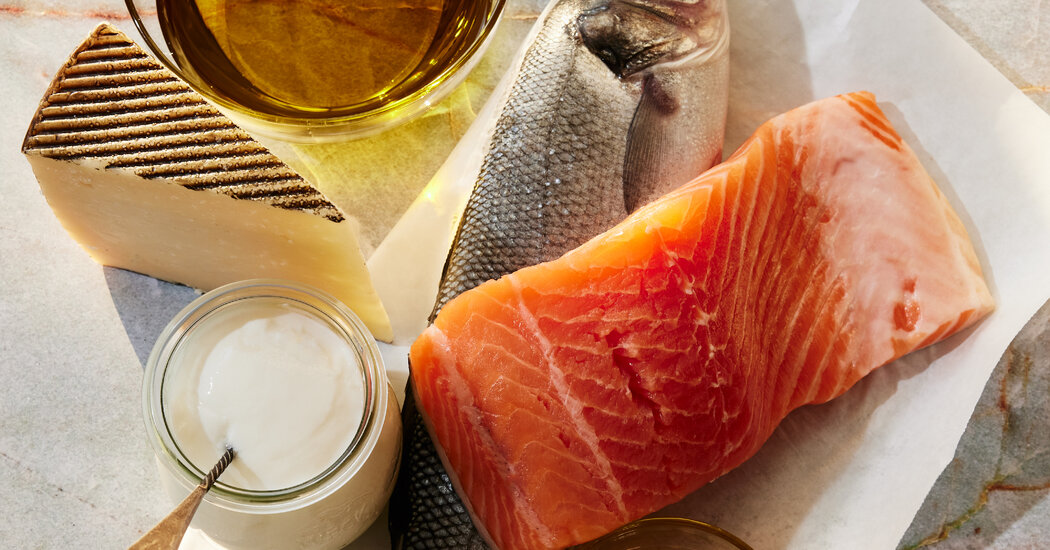
This is Day 5 of Well’s Mediterranean Diet Week. Start at the beginning here.
The Mediterranean diet isn’t like other diets. To begin with, it’s more of a style of eating than a strict regimen. And adopting it doesn’t involve many of the sacrifices people associate with healthy eating.
Compared with other wholesome diets, for example, the Mediterranean diet is relatively high in fat. Federal health officials recommend that 20 to 35 percent of your daily calories come from fat — while that number can be around 30 to 40 percent in the Mediterranean diet.
Yet in clinical trials, people who followed the Mediterranean diet had lower blood pressure and cholesterol levels and were less likely to develop cardiovascular disease than those who followed a low-fat diet.
That’s probably because the Mediterranean diet emphasizes heart-healthy fats from sources like olive oil, fish, whole grains, and nuts and seeds. And it includes less saturated fat than the typical American diet, because it discourages butter and red and processed meats and includes only moderate amounts of cheese, yogurt, poultry and eggs.
Researchers believe that olive oil, the preferred fat source in the Mediterranean diet, may be one of the main contributors to its health benefits. It’s rich in heart-healthy monounsaturated fats and has antioxidant and anti-inflammatory properties that can prevent damage to your cells and blood vessels.
In a 2022 study of more than 90,000 U.S. adults spanning 28 years, for instance, those who consumed at least half a tablespoon of olive oil each day were significantly less likely to die of cancer or cardiovascular, neurodegenerative or respiratory diseases than those who rarely or never consumed it.
Fish also features prominently in the Mediterranean diet, especially fatty varieties like salmon, tuna, anchovies and sardines. These are excellent sources of omega-3 fatty acids, which can improve blood cholesterol levels and reduce inflammation and blood pressure. Most Mediterranean diet guidelines recommend at least two servings of fish per week.
But let’s not give olive oil and fish all of the credit. Whole grains, nuts, seeds and olives also contribute to the diet’s healthy fats. And though they’re not native to the Mediterranean region, avocados are rich in monounsaturated fats and are often included in modern versions of the diet. Below, we offer ideas for incorporating these foods into your routine, along with some recipes our colleagues at NYT Cooking have selected.
What to keep on hand
Earlier this week, we stocked up on whole grains, nuts and seeds. Here are a few more items to infuse healthy fats into your meals:
-
Extra-virgin olive oil (our colleagues at Wirecutter have shared their favorite grocery store brands in this guide)
-
Avocados
-
Canned (or tinned) fish like tuna, salmon, anchovies and sardines
-
Fresh or frozen fish like salmon, tuna, mackerel and cod
How to cook with healthy fats
For each day of our Mediterranean diet series, we and our colleagues at NYT Cooking have picked a few recipes that embrace the ingredients we’re highlighting. This is not intended to be a meal plan for a day, but rather inspiration for how to include more of these healthful foods in your week.
For breakfast, you might smash some avocado onto whole-grain toast and top it with a drizzle of olive oil. In this recipe from Julia Moskin and Giles Russell, optional garnishes like fresh herbs, pickled red onions and pumpkin or sesame seeds take avocado toast to the next level.
Craig Claiborne’s classic tuna salad sandwich is a quick, budget-friendly lunch option — but if you’re looking for something more “intense and pronounced,” try Ali Slagle’s sardine salad on a whole-wheat bagel, over greens or between two slices of whole-grain toast. Anchovies are also a flavorful addition to salad dressing, as in David Tanis’s vibrant radicchio-anchovy salad.
For dinner, try Alison Roman’s slow-roasted citrus salmon with herb salad (ready in 35 minutes) or Mark Bittman’s grilled tuna with herbs and olives (ready in 20). And let’s not forget about tinned and jarred fish. Sohla El-Waylly’s sardine pasta puttanesca makes good used of anchovies and tinned sardines.
I’ve long been a purist about baking with butter, but I’m experimenting with using olive oil in desserts, like Samantha Seneviratne’s elegant lemon-scented olive oil cake. A wedge of that moist beauty, maybe topped with fresh fruit, is the perfect way to cap off a week of good eating.



